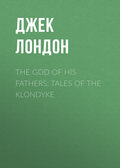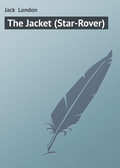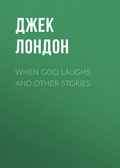
Джек Лондон
Smoke Bellew
“Mine eyes have seen the glory of the coming of the Lord,” Smoke chanted, as he gazed upon these dusts of snow wind-driven into sky-scarves of shimmering silken light.
And still he gazed, and still the bannered peaks did not vanish, and still he considered that he dreamed, until Labiskwee sat up among the furs.
“I dream, Labiskwee,” he said. “Look. Do you, too, dream within my dream?”
“It is no dream,” she replied. “This have the old men told me. And after this will blow the warm winds, and we shall live and win west.”
Smoke shot a snow-bird, and they divided it. Once, in a valley where willows budded standing in the snow, he shot a snowshoe rabbit. Another time he got a lean, white weasel. This much of meat they encountered, and no more, though, once, half-mile high and veering toward the west and the Yukon, they saw a wild-duck wedge drive by.
“It is summer in the lower valleys,” said Labiskwee. “Soon it will be summer here.”
Labiskwee’s face had grown thin, but the bright, large eyes were brighter and larger, and when she looked at him she was transfigured by a wild, unearthly beauty.
The days lengthened, and the snow began to sink. Each day the crust thawed, each night it froze again; and they were afoot early and late, being compelled to camp and rest during the midday hours of thaw when the crust could not bear their weight. When Smoke grew snow-blind, Labiskwee towed him on a thong tied to her waist. And when she was so blinded, she towed behind a thong to his waist. And starving, in a deeper dream, they struggled on through an awakening land bare of any life save their own.
Exhausted as he was, Smoke grew almost to fear sleep, so fearful and bitter were the visions of that mad, twilight land. Always were they of food, and always was the food, at his lips, snatched away by the malign deviser of dreams. He gave dinners to his comrades of the old San Francisco days, himself, with whetting appetite and jealous eye, directing the arrangements, decorating the table with crimson-leafed runners of the autumn grape. The guests were dilatory, and while he greeted them and all sparkled with their latest cleverness, he was frantic with desire for the table. He stole to it, unobserved, and clutched a handful of black ripe olives, and turned to meet still another guest. And others surrounded him, and the laugh and play of wit went on, while all the time, hidden in his closed hand, was this madness of ripe olives.
He gave many such dinners, all with the same empty ending. He attended Gargantuan feasts, where multitudes fed on innumerable bullocks roasted whole, prying them out of smoldering pits and with sharp knives slicing great strips of meat from the steaming carcasses. He stood, with mouth agape, beneath long rows of turkeys which white-aproned shopmen sold. And everybody bought save Smoke, mouth still agape, chained by a leadenness of movement to the pavement. A boy again, he sat with spoon poised high above great bowls of bread and milk. He pursued shy heifers through upland pastures and centuries of torment in vain effort to steal from them their milk, and in noisome dungeons he fought with rats for scraps and refuse. There was no food that was not a madness to him, and he wandered through vast stables, where fat horses stood in mile-long rows of stalls, and sought but never found the bran-bins from which they fed.
Once, only, he dreamed to advantage. Famishing, shipwrecked or marooned, he fought with the big Pacific surf for rock-clinging mussels, and carried them up the sands to the dry flotsam of the spring tides. Of this he built a fire, and among the coals he laid his precious trove. He watched the steam jet forth and the locked shells pop apart, exposing the salmon-colored meat. Cooked to a turn – he knew it; and this time there was no intruding presence to whisk the meal away. At last – so he dreamed within the dream – the dream would come true. This time he would eat. Yet in his certitude he doubted, and he was steeled for the inevitable shift of vision until the salmon-colored meat, hot and savory, was in his mouth. His teeth closed upon it. He ate! The miracle had happened! The shock aroused him. He awoke in the dark, lying on his back, and heard himself mumbling little piggish squeals and grunts of joy. His jaws were moving, and between his teeth meat was crunching. He did not move, and soon small fingers felt about his lips, and between them was inserted a tiny sliver of meat. And in that he would eat no more, rather than that he was angry, Labiskwee cried and in his arms sobbed herself to sleep. But he lay on awake, marveling at the love and the wonder of woman.
The time came when the last food was gone. The high peaks receded, the divides became lower, and the way opened promisingly to the west. But their reserves of strength were gone, and, without food, the time quickly followed when they lay down at night and in the morning did not arise. Smoke weakly gained his feet, collapsed, and on hands and knees crawled about the building of a fire. But try as she would Labiskwee sank back each time in an extremity of weakness. And Smoke sank down beside her, a wan sneer on his face for the automatism that had made him struggle for an unneeded fire. There was nothing to cook, and the day was warm. A gentle breeze sighed in the spruce-trees, and from everywhere, under the disappearing snow, came the trickling music of unseen streamlets.
Labiskwee lay in a stupor, her breathing so imperceptible that often Smoke thought her dead. In the afternoon the chattering of a squirrel aroused him. Dragging the heavy rifle, he wallowed through the crust that had become slush. He crept on hands and knees, or stood upright and fell forward in the direction of the squirrel that chattered its wrath and fled slowly and tantalizingly before him. He had not the strength for a quick shot, and the squirrel was never still. At times Smoke sprawled in the wet snow-melt and cried out of weakness. Other times the flame of his life flickered, and blackness smote him. How long he lay in the last faint he did not know, but he came to, shivering in the chill of evening, his wet clothing frozen to the re-forming crust. The squirrel was gone, and after a weary struggle he won back to the side of Labiskwee. So profound was his weakness that he lay like a dead man through the night, nor did dreams disturb him.
The sun was in the sky, the same squirrel chattering through the trees, when Labiskwee’s hand on Smoke’s cheek awakened him.
“Put your hand on my heart, lover,” she said, her voice clear but faint and very far away. “My heart is my love, and you hold it in your hand.”
A long time seemed to go by, ere she spoke again.
“Remember always, there is no way south. That is well known to the Caribou People. West – that is the way – and you are almost there – and you will make it.”
And Smoke drowsed in the numbness that is near to death, until once more she aroused him.
“Put your lips on mine,” she said. “I will die so.”
“We will die together, sweetheart,” was his answer.
“No.” A feeble flutter of her hand checked him, and so thin was her voice that scarcely did he hear it, yet did he hear all of it. Her hand fumbled and groped in the hood of her parka, and she drew forth a pouch that she placed in his hand. “And now your lips, my lover. Your lips on my lips, and your hand on my heart.”
And in that long kiss darkness came upon him again, and when again he was conscious he knew that he was alone and he knew that he was to die. He was wearily glad that he was to die.
He found his hand resting on the pouch. With an inward smile at the curiosity that made him pull the draw-string, he opened it. Out poured a tiny flood of food. There was no particle of it that he did not recognize, all stolen by Labiskwee from Labiskwee – bread-fragments saved far back in the days ere McCan lost the flour; strips and strings of caribou-meat, partly gnawed; crumbles of suet; the hind-leg of the snowshoe rabbit, untouched; the hind-leg and part of the fore-leg of the white weasel; the wing dented still by her reluctant teeth, and the leg of the snow-bird – pitiful remnants, tragic renunciations, crucifixions of life, morsels stolen from her terrible hunger by her incredible love.
With maniacal laughter Smoke flung it all out on the hardening snow-crust and went back into the blackness.
He dreamed. The Yukon ran dry. In its bed, among muddy pools of water and ice-scoured rocks, he wandered, picking up fat nugget-gold. The weight of it grew to be a burden to him, till he discovered that it was good to eat. And greedily he ate. After all, of what worth was gold that men should prize it so, save that it was good to eat?
He awoke to another sun. His brain was strangely clear. No longer did his eyesight blur. The familiar palpitation that had vexed him through all his frame was gone. The juices of his body seemed to sing, as if the spring had entered in. Blessed well-being had come to him. He turned to awaken Labiskwee, and saw, and remembered. He looked for the food flung out on the snow. It was gone. And he knew that in delirium and dream it had been the Yukon nugget-gold. In delirium and dream he had taken heart of life from the life sacrifice of Labiskwee, who had put her heart in his hand and opened his eyes to woman and wonder.
He was surprised at the ease of his movements, astounded that he was able to drag her fur-wrapped body to the exposed thawed gravel-bank, which he undermined with the ax and caved upon her.
Three days, with no further food, he fought west. In the mid third day he fell beneath a lone spruce beside a wide stream that ran open and which he knew must be the Klondike. Ere blackness conquered him, he unlashed his pack, said good-by to the bright world, and rolled himself in the robes.
Chirping, sleepy noises awoke him. The long twilight was on. Above him, among the spruce boughs, were ptarmigan. Hunger bit him into instant action, though the action was infinitely slow. Five minutes passed before he was able to get his rifle to his shoulder, and a second five minutes passed ere he dared, lying on his back and aiming straight upward, to pull the trigger. It was a clean miss. No bird fell, but no bird flew. They ruffled and rustled stupidly and drowsily. His shoulder pained him. A second shot was spoiled by the involuntary wince he made as he pulled trigger. Somewhere, in the last three days, though he had no recollection how, he must have fallen and injured it.
The ptarmigan had not flown. He doubled and redoubled the robe that had covered him, and humped it in the hollow between his right arm and his side. Resting the butt of the rifle on the fur, he fired again, and a bird fell. He clutched it greedily and found that he had shot most of the meat out of it. The large-caliber bullet had left little else than a mess of mangled feathers. Still the ptarmigan did not fly, and he decided that it was heads or nothing. He fired only at heads. He reloaded and reloaded the magazine. He missed; he hit; and the stupid ptarmigan, that were loath to fly, fell upon him in a rain of food – lives disrupted that his life might feed and live. There had been nine of them, and in the end he clipped the head of the ninth, and lay and laughed and wept he knew not why.
The first he ate raw. Then he rested and slept, while his life assimilated the life of it. In the darkness he awoke, hungry, with strength to build a fire. And until early dawn he cooked and ate, crunching the bones to powder between his long-idle teeth. He slept, awoke in the darkness of another night, and slept again to another sun.
He noted with surprise that the fire crackled with fresh fuel and that a blackened coffee-pot steamed on the edge of the coals. Beside the fire, within arm’s length, sat Shorty, smoking a brown-paper cigarette and intently watching him. Smoke’s lips moved, but a throat paralysis seemed to come upon him, while his chest was suffused with the menace of tears. He reached out his hand for the cigarette and drew the smoke deep into his lungs again and again.
“I have not smoked for a long time,” he said at last, in a low calm voice. “For a very long time.”
“Nor eaten, from your looks,” Shorty added gruffly.
Smoke nodded and waved his hand at the ptarmigan feathers that lay all about.
“Not until recently,” he returned. “Do you know, I’d like a cup of coffee. It will taste strange. Also flapjacks and a strip of bacon.”
“And beans?” Shorty tempted.
“They would taste heavenly. I find I am quite hungry again.”
While the one cooked and the other ate, they told briefly what had happened to them in the days since their separation.
“The Klondike was breakin’ up,” Shorty concluded his recital, “an’ we just had to wait for open water. Two polin’ boats, six other men – you know ‘em all, an’ crackerjacks – an’ all kinds of outfit. An’ we’ve sure been a-comin’ – polin’, linin’ up, and portagin’. But the falls’ll stick ‘em a solid week. That’s where I left ‘em a-cuttin’ a trail over the tops of the bluffs for the boats. I just had a sure natural hunch to keep a-comin’. So I fills a pack with grub an’ starts. I knew I’d find you a-driftin’ an’ all in.”
Smoke nodded, and put forth his hand in a silent grip. “Well, let’s get started,” he said.
“Started hell!” Shorty exploded. “We stay right here an’ rest you up an’ feed you up for a couple of days.”
Smoke shook his head.
“If you could just see yourself,” Shorty protested.
And what he saw was not nice. Smoke’s face, wherever the skin showed, was black and purple and scabbed from repeated frost-bite. The cheeks were fallen in, so that, despite the covering of beard, the upper rows of teeth ridged the shrunken flesh. Across the forehead and about the deep-sunk eyes, the skin was stretched drum-tight, while the scraggly beard, that should have been golden, was singed by fire and filthy with camp-smoke.
“Better pack up,” Smoke said. “I’m going on.”
“But you’re feeble as a kid baby. You can’t hike. What’s the rush?”
“Shorty, I am going after the biggest thing in the Klondike, and I can’t wait. That’s all. Start packing. It’s the biggest thing in the world. It’s bigger than lakes of gold and mountains of gold, bigger than adventure, and meat-eating, and bear-killing.”
Shorty sat with bulging eyes. “In the name of the Lord, what is it?” he queried huskily. “Or are you just simple loco?”
“No, I’m all right. Perhaps a fellow has to stop eating in order to see things. At any rate, I have seen things I never dreamed were in the world. I know what a woman is, – now.”
Shorty’s mouth opened, and about the lips and in the light of the eyes was the whimsical advertisement of the sneer forthcoming.
“Don’t, please,” Smoke said gently. “You don’t know. I do.”
Shorty gulped and changed his thought. “Huh! I don’t need no hunch to guess HER name. The rest of ‘em has gone up to the drainin’ of Surprise Lake, but Joy Gastell allowed she wouldn’t go. She’s stickin’ around Dawson, waitin’ to see if I come back with you. An’ she sure swears, if I don’t, she’ll sell her holdin’s an’ hire a army of gun-fighters, an’ go into the Caribou Country an’ knock the everlastin’ stuffin’ outa old Snass an’ his whole gang. An’ if you’ll hold your horses a couple of shakes, I reckon I’ll get packed up an’ ready to hike along with you.”






